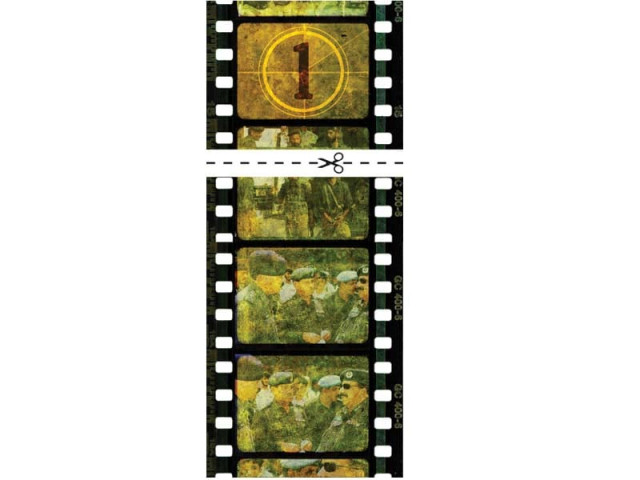Lollywood’s fake cops await rescue
Abdul Razzaq Maula’s league of extra actors in search of jobs

Abdul Razzaq Maula’s league of extra actors in search of jobs. DESIGN: HIRA FAREED
Although the tide against Lollywood has somewhat died down, it has caused a fundamental paradigm shift in the world of Pakistani cinema. Much is said and written about the livelihoods of hundreds of those who were associated with the old world of film but the plight of 200 odd extras at Lahore’s Bari Studios remains unheard.
During the reign of greats like Sultan Rahi, violence and crime were becoming recurrent themes in Pakistani films. To feed this monster of a film culture, the industry required hundreds of men who were willing to get beaten to pulp on screen, go flying in all directions when the hero moves his fingers and arrive at the crime scene, late as always, in shape of the local police.
Film enthusiasts find Waheed Muraad’s Armaan a treat
“There is nothing more unaesthetic than a policeman.” These words were said by perhaps one of the greatest crime fiction writers to walk the earth, Sir Arthur Conan Doyle. In order to prove Doyle wrong and give birth to an industry of fake policemen, stepped in Abdul Razzaq Maula several decades ago.

Razzaq’s men prepared vehicles and stunt scenes, decorated sets, arranged for costumes and fake ammunition. All this stopped nearly 20 years ago. Most of his recruits were those who merely walked into the studios to catch a glimpse of their favourite heroes acting it out. For years, Razzaq and his 200 employees have been waiting for the next Sultan Rahi who’d bring their livelihood back to life. Back then there existed numerous of these talent management companies but today only Razzaq’s door is still open. Then again, in a time and age when little attention is paid to the issues of real police officials, who would care about those who don berets, paste fake moustaches on their faces and carry fake rifles on their shoulders for a mere film appearance?
“There was a time when I was able to give work to all 200 of these people. Today I cannot even help out a few dozens,” recalls Razzaq who has been in this business for the last 40 years. “During my entire career I never saw stuntmen and extras in such a bad condition.”
The romance and the Kalashnikov: Pashtun cinema reborn
Like most of his fellows, Razzaq too misses Sultan Rahi. “He was a poor man’s friend. He used to support people like us. He never cared about his own paychecks and signed numerous films just so that this industry keeps running,” he says. Things are no more the same. With the death of Sultan Rahi, a whole genre of films in Pakistan was orphaned. “An era of action films ended with the death of Sultan Rahi.”

Razzaq agrees that actor Shaan did try his best to shoulder the legacy. “Yes, he did make action films but he seldom bothered about us. All he cared was about his own career,” he maintains.
Wiping sweat off his forehead, he continues, “You see our work isn’t as easy as it seems. We first need permission from the police department for making fakes of their vehicles and uniforms. We have to train the extras with regard to their roles as police officials and teach them how to say their dialogues.” The industry’s revival in Karachi, Razzaq notes, has little in store for hundreds of people like him who are waiting for the sun to shine in Lahore. “Only the rebirth of action films can help us.”
Razzaq’s co-worker Abdul Rahim points out towards those extra actors who were injured during the filming of action scenes. “A number of film police officials who were injured during shoots are also lamenting over the situation. They are our people who can no longer work. I urge the government to arrange for their welfare.”
Published in The Express Tribune, December 7th, 2015.
Like Life & Style on Facebook, follow @ETLifeandStyle on Twitter for the latest in fashion, gossip and entertainment.



















COMMENTS
Comments are moderated and generally will be posted if they are on-topic and not abusive.
For more information, please see our Comments FAQ